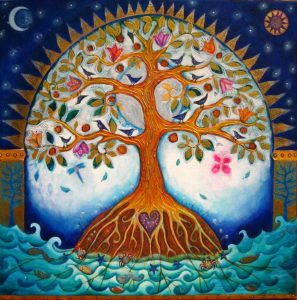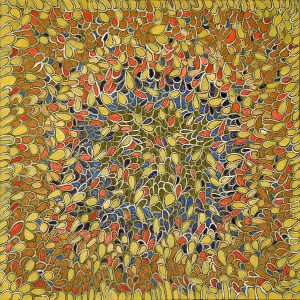 The Yogabliss on-line Moving into Meditation classes met this morning. We explored the cultivation of appreciation and joy.
The Yogabliss on-line Moving into Meditation classes met this morning. We explored the cultivation of appreciation and joy.
We drew on the teachings of Zen Master Thich Nhat Hanh. This great teacher valued community most highly. We explored the Plum Village Begin Anew community supporting practices.
We heard Li-Young Lee’s beautiful poem of appreciation and savoring: From Blossoms.
Welcome. I invite you to relax into this present moment. If you like you can take a few deep breaths savoring this living energy and relaxing. Feel yourself newly arriving with each breath. Be awake and aware of your body, sensations, mind, thoughts, emotions. You may also be aware of the presence of our group members. Together we form a ring of welcome. We aspire to answer each invitation to be present. To sense what surfaces. We answer each invitation to be present with awareness. Welcoming as Rumi writes:
A joy, a depression,. . . some momentary awareness comes as an unexpected visitor.
We aspire to be with our restlessness or anticipation, our aches and the absence of aches, our emotional weather. Here, in the compassionate space of our practice, we have room for it all.
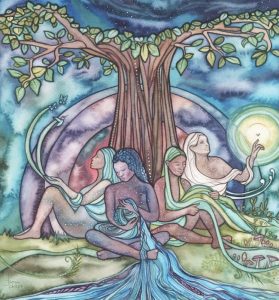 We can pause and reflect on the meaning of our lives. Our search for meaning is something so essential to being human, knowing that in being born we are destined to die. In the moments of life that we have we search for beauty, for truth and for love. We touch these qualities and are touched by them.
We can pause and reflect on the meaning of our lives. Our search for meaning is something so essential to being human, knowing that in being born we are destined to die. In the moments of life that we have we search for beauty, for truth and for love. We touch these qualities and are touched by them.
We are part of a web in which we find meaning and we also create meaning for others. Right now we can reflect on our constellation of relationships: family members and friends. Those who touch us – through kinship, friendship or through our work and creative expression. What we do and who we become is always in relationship. And of course – our constellation is embedded in the greater web which sustains us: the earth and all creation. What and who touches you deeply? Where do you find meaning in the uncertainty of life?
Zen Master and teacher, Thich Nhat Hanh, valued Sangha, spiritual community, most highly. In his talks and writings he said:
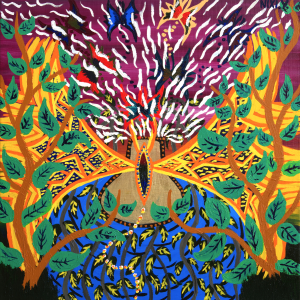 It is possible the next Buddha will not take the form of an individual. The next Buddha may take the form of a community, a community practicing understanding and lovingkindness, a community practicing mindful living.
It is possible the next Buddha will not take the form of an individual. The next Buddha may take the form of a community, a community practicing understanding and lovingkindness, a community practicing mindful living.
In the Plum Village Buddhist monastic community, members share in a practice called Beginning Anew. Brother Bao Tang explains:
To begin anew is to look deeply and honestly at ourselves, our past actions, speech and thoughts and to create a fresh beginning within ourselves and in our relationships with others.
 This is what we do each time we practice mindfulness. We bring the open heartedness and open-mindedness of a beginner. We bring beginner’s mind. We offer ourselves the time and space to reflect on our thoughts, words and deeds. Each spring from the minds of our conditioning and then go on to have a life of their own. We aspire to hold these reflections with compassion and forgiveness. We can recognize our shared humanity.
This is what we do each time we practice mindfulness. We bring the open heartedness and open-mindedness of a beginner. We bring beginner’s mind. We offer ourselves the time and space to reflect on our thoughts, words and deeds. Each spring from the minds of our conditioning and then go on to have a life of their own. We aspire to hold these reflections with compassion and forgiveness. We can recognize our shared humanity.
Part of Beginning Anew is the practice of Flower Watering which Brother Tang describes:
This is a chance to share our appreciation for the other person. We may mention . . . instances [when] the other person said or did something that we had admired. This is an opportunity to shine light on the other’s strengths and contributions to the sangha and to encourage the growth of his or her positive qualities. . . . As in a garden, when we “water the flowers” of loving kindness and compassion in each other, we also take energy away from the weeds of anger, jealousy and misperception.
 This practice of looking for another’s goodness quiets the comparing mind or the mind that looks for others’ faults. Truly appreciating and acknowledging the loving kindness and compassion in each other can be our orientation in relationship. We can support the development of this orientation through the practice of appreciative joy or Mudita. In the practice of appreciative joy, we cultivate and feel happiness in the happiness of others.
This practice of looking for another’s goodness quiets the comparing mind or the mind that looks for others’ faults. Truly appreciating and acknowledging the loving kindness and compassion in each other can be our orientation in relationship. We can support the development of this orientation through the practice of appreciative joy or Mudita. In the practice of appreciative joy, we cultivate and feel happiness in the happiness of others.
We can begin by noticing what is working in our lives. Thich Nhat Hanh asked
How can we feel joy for another person when we do not feel joy for ourselves? Joy is for everyone.
I invite you to take moment to reflect on this question:
 “What brings me joy?” Wait for the answer. Recognize it. Relish it. And ask again: “What brings me joy?” Notice the blessing of joy that comes to mind. Recognize it, savor it, then repeat again, “What brings me joy?” Keep repeating the question and reflecting on all the ordinary and extraordinary occurrences that bring you joy. Give yourself permission to feel good and see your life through the eyes of joy.
“What brings me joy?” Wait for the answer. Recognize it. Relish it. And ask again: “What brings me joy?” Notice the blessing of joy that comes to mind. Recognize it, savor it, then repeat again, “What brings me joy?” Keep repeating the question and reflecting on all the ordinary and extraordinary occurrences that bring you joy. Give yourself permission to feel good and see your life through the eyes of joy.
You might call to mind someone you have affection for, a family member or friend. See them in your mind’s eye. Imagine you could ask them and they would answer:“What brings you joy?” Wait for the answer. Recognize it. Savor it. When you’re ready you might silently wish “May you be blessed with this joy. May this joy bring you happiness.” You can use any other phrases that come to your heart.
 We can reflect together on the blessings the world has given to us. Our feeling, sensing, thinking, moving capacities are miraculous. The constellation of relationships we hold with the living world is so precious. All has been given to us. From the basics of survival – food and water, fire and shelter to the alchemical mysteries of culture – creativity and language.
We can reflect together on the blessings the world has given to us. Our feeling, sensing, thinking, moving capacities are miraculous. The constellation of relationships we hold with the living world is so precious. All has been given to us. From the basics of survival – food and water, fire and shelter to the alchemical mysteries of culture – creativity and language.
How are we present for life’s blessings, for life’s daily miracles? Right now we tenderly give ourselves time – time to bring our blessings and joys to awareness. Let’s celebrate them with Li-Young Lee’s poem From Blossoms:
From blossoms comes
this brown paper bag of peaches
we bought from the boy
at the bend in the road where we turned toward
signs painted Peaches.
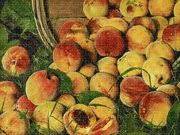 From laden boughs, from hands,
From laden boughs, from hands,
from sweet fellowship in the bins,
comes nectar at the roadside, succulent
peaches we devour, dusty skin and all,
comes the familiar dust of summer, dust we eat.
O, to take what we love inside,
to carry within us an orchard, to eat
not only the skin, but the shade,
not only the sugar, but the days, to hold
the fruit in our hands, adore it, then bite into
the round jubilance of peach.
There are days we live
as if death were nowhere
in the background; from joy
to joy to joy, from wing to wing,
from blossom to blossom to
impossible blossom, to sweet impossible blossom.

